HIT CHANNEL EXCLUSIVE INTERVIEW: December 2021. We had the great honour to talk with a legendary musician: K.K. Downing. He is best known as a founding member and guitarist of Judas Priest for 40 years. On 1 October, his new band, KK’s Priest released their debut album called “Sermons of the Sinner” (EX1 Records). Former Judas Priest vocalist, Tim “Ripper” Owens joined him in KK’s Priest. In 2018, K.K. published his critically acclaimed autobiography: “Heavy Duty: Days and Nights in Judas Priest”. Read below the very interesting things he told us:
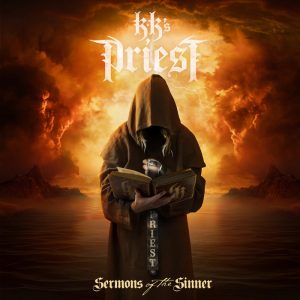 First of all, it’s an honour to talk with you. Could you describe to us the writing process of “Sermons of the Sinner” album?
First of all, it’s an honour to talk with you. Could you describe to us the writing process of “Sermons of the Sinner” album?
I’m happy to speak with you and I say to everyone in Greece: “Nice to make contact with you, guys!” I had in mind to put a band together but in 2019, in December, Christmas, I decided to sit down and see how the writing went for a new album. It went really well, it went fast and it sounded good and that gave me the confidence then to ask the guys to join with me and put the band together.
Why did you decide to write “Return of the Sentinel”, a sequel to “The Sentinel” (from “Defenders of the Faith” album -1984) ?
Very good question. In Judas Priest I had a very long legacy and career and it was unfortunate that I wasn’t able to rejoin the band because they didn’t want that to happen, but I felt if I was going to do a new band and a new project, I felt quite comfortable to bring something with me into the present and the future. It sounded like a very nice idea to do a sequel to one of the songs and I couldn’t have done many songs. I could have done “Sinner”, “One Shot at Glory” or “Blood Red Skies”. I had to choose one so I thought “The Sentinel” would be a good song to do a new complete song about bringing “The Sentinel” into the future. I liked that idea and I thought it was quite unique and it just makes me good that I have some attachment to my legacy to take with me with KK’s Priest into the future.
I really like the guitar solos from “Sermons of the Sinner” album, especially in songs like “Sermons of the Sinner” and “Metal Through and Through”. Was there any particular concept regarding solos? Did you want to sound fast or aggressive or old-school or anything else?
I just wanted to do a very good variety of different styles of solos and solo work to make the album interesting and I also wanted for the two guitar players to share the solos equally, because that’s the way it should always be really in a two-guitar player band. I just wanted to do quite an abundance of solo work because I think lead guitar playing is a very exciting feature of the record.
 You called the band KK’s Priest. Did you consider other names?
You called the band KK’s Priest. Did you consider other names?
Yes, I tried to think of another name, you know but I found it very difficult to leave at least the word “Priest” behind, because I started Priest in 1969 and I had always been a Priest. I was always very loyal, I never played with other musicians, I never recorded with other musicians and I felt that if I wasn’t going to be allowed back into the Judas Priest then I feel entitled to be able to at least do a version of KK’s Priest the way that I hear Priest and the way I think the Priest should be.
Was Tim “Ripper” Owens an obvious choice for the role of the lead vocalist of the band?
Yes, definitely because I knew Tim, we were good friends. He’s incredible singer, we all know that. We had already done two albums and a lot of touring together, so we were very familiar with each other and he is a part of Priest.
Will you tour for “Sermons of the Sinner”?
Yes, absolutely. We will probably start touring early summer.
How emotional was it for you to write your autobiography “Heavy Duty: Days and Nights in Judas Priest”?
I was never considering writing an autobiography but around that time, 2016 or whatever it was, things were getting worse and worse and deteriorating between myself and my former bandmates. I was getting legal letters from their lawyers, and so I thought: “They are not gonna have me in the band. I don’t have a band. Maybe, I am getting much older now, so maybe I’ll write my autobiography” and that’s what I did because I wanted the fans to get to know me a little bit better.
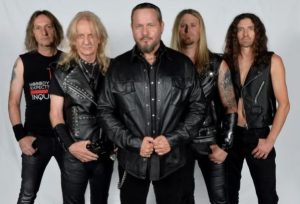 You are my favourite member of Judas Priest and I think you have done more than you have been given credit for. Do you agree with this statement?
You are my favourite member of Judas Priest and I think you have done more than you have been given credit for. Do you agree with this statement?
Thank you very much. That’s very kind of you to say that. I do feel that and that’s have been frustrating for me, really, because obviously being started the band and writing for the band for the first four years all those songs. Yeah, like I said, I was always very loyal and true to Judas Priest, I never wanted off before. Rob (ed: Halford –vocals) left the band for 12-13 years, Glenn (ed: Tipton –guitar) did some solo albums, but I never had the desire. Judas Priest was everything to me. Everything. So, in 2010 we were going to end the band. We were all going to retire. We had planned a farewell tour, the Epitaph Tour and we were just going to do that tour, then finish the band. All the indications were that I was not going to enjoy the farewell tour, so I said to them: “I’m not doing it. You need to find somebody else to fill in for me to do the farewell tour”. I didn’t realise that they would continue for another 10 years and they still continue now. I didn’t realise that was going to happen.
You were never very close to Glenn Tipton but you were the best guitar duo of all time. What was the secret of the great chemistry you had together on stage and in the studio?
Myself and Glenn, we were very hard workers and we did an awful lot together. It’s like any relationship. There are always things where you are going to have differences, but in most relationships there are probably more things that you have in common, than the other way round. Glenn and myself, we are both Scorpios, we both like sports, we both obviously loved to do what we did, we love to play guitar, we love to write songs. So, we had a lot of things in common, but we knew that we had to work together and make it work, otherwise we would fail. I think that’s what helped make us such a good, powerful working relationship and I’m very grateful to Glenn for that and I will always respect him a lot, more so than the other guys in the band actually, because Glenn was the hardest worker, other than myself, in band. Glenn was dedicated and he worked very-very hard.
Do you consider yourself a lead guitarist?
Absolutely! I should have done more on the Judas Priest records. I wasn’t happy about that, because I can do more. A lot more and that has always been the case. But now I ‘m happy, I can do what I want. I’m writing more songs now for the next record and I’m looking forward to lots more cool guitar solos.
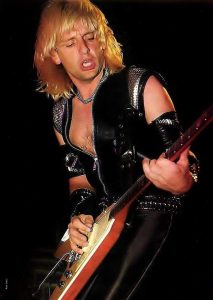 How important was the role of Chris Tsangarides (Gary Moore, Thin Lizzy, Black Sabbath producer) in “Painkiller” (1990) album?
How important was the role of Chris Tsangarides (Gary Moore, Thin Lizzy, Black Sabbath producer) in “Painkiller” (1990) album?
I think Chris was very important. Chris was a very talented producer and a wonderful guy. He was a very good producer and a guitar player, as well. He loved guitars and he was a very good guy to work with. Yeah, we sorely miss him. Chris achieved so much in his life and it’s a shame that he passed away so young (ed: In 2018 at the age of 61), otherwise we would still be having more great records from Chris.
“Painkiller” is now considered a classic album but when it was released the fans weren’t very enthusiastic about it. Do you think it was ahead of its time?
Yes, I think so. It’s very rare that you get the timing exactly right for a record. It’s either ahead or behind, really. You are right, we were very disappointed in the reaction on the “Painkiller” album, because it wasn’t very successful. But as you say now, with time, it’s a classic album and I’m quite confident that “Sermons of the Sinner” hopefully in time to come, will be considered a really excellent album.
What is the real reason that you are out of Judas Priest?
I think whatever happens now, I will never-never go back. It’s too late, but it will never happen, anyway. I think Rob and Ian (ed: Hill –bass) would definitely have me back. Definitely. Because Rob left the band for 14 years and I introduced him back into the band, so why wouldn’t he do the same for me? And Ian; Ian never wrote any of the songs, he just played the bass all those years and he is playing my songs making money from them, but won’t allow me to play my songs? That’s incredible! Me and Ian, we went to kindergarten together. He was like the brother that I never had. We were so close, so something is wrong, something is seriously wrong. They told the world that I retired, so why wouldn’t they allow me out of the retirement, if that’s the only problem? It doesn’t make sense. Maybe as a journalist, when you interview them, you can ask them, Theo.
Yes, if I have the opportunity. How do you feel when you watch the performance of Judas Priest on the Old Grey Whistle Test in 1975?
I love it. Because we loved each of the time and it was a very long time ago. I’m proud of everything we did. We were still finding our way, trying to improve. As I say, it was a very-very long time ago and they made us turn around way down, very-very low.
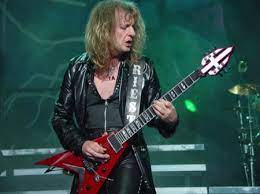 Judas Priest opened for Led Zeppelin at Day on the Green shows in Oakland in 1977. Do you have any memories of these shows?
Judas Priest opened for Led Zeppelin at Day on the Green shows in Oakland in 1977. Do you have any memories of these shows?
Yes, fantastic shows. It was our first tour in America and we were playing clubs and small theatres and then we were just about to go back home, to England, and somebody said: “They need a third act on the bill for Led Zeppelin in Oakland, two shows”. “Great, let’s go (laughs). We don’t know where Oakland is, but let’s go” and we did. It was brilliant. We enjoyed it very much. It was good, because Led Zeppelin, a couple of the guys were from my hometown, just outside of Birmingham, a place called West Bromwich and Dudley. Obviously, John Bonham (ed: drums) was from Dudley, which is two miles from West Bromwich and Robert (ed: Plant –vocals) married his wife, Maureen from West Bromwich, where I lived and of course Ian was from West Bromwich. Robert is from West Bromwich also and Glenn was close by. It was like family, really.
Was it an interesting experience to play at the Live Aid concert in 1985?
Yeah, that was great to do, as well. That was fun. A lot of fun. We were recording an album, “Turbo” album, in The Bahamas, so we just jumped on a flight to Philadelphia and played the gig. It was a brilliant memory. I ‘m so happy. But we were one of the first bands to agree to do that. I think we were band #5 and then it just got big and big and big.
In your book you mention that you once bumped into Robert Plant at Bellman’s pub. What did you talk about?
Anything but music (laughs). But we used to play tennis together because Robert lives very close to me, still. We are still neighbours. I used to have a tennis court in my house, so Robert came up a couple of times and we played tennis. We had the same manager for many-many years. We still live in the same area. So, sometimes I go in the Bellman’s and that’s his local pub. Just a few miles from me and it’s a great restaurant. The food there is fantastic. Last time I saw Robert we talked about tennis and he said: “Oh, my shoulder is in pain these days”, so he doesn’t play anymore.
 You watched Jimi Hendrix live 6 times. How much impact did these concerts have on you?
You watched Jimi Hendrix live 6 times. How much impact did these concerts have on you?
A massive impact, because it was astonishing. It’s still the most incredible thing that I have ever seen: To see Jimi Hendrix in a theatre back in 1967, when he was so fresh and he was just throwing a great show. He was such a free spirit. He was like a magician on stage. You couldn’t believe your eyes what you are seeing. It was so incredible that everybody in England that was seeing him then, Eric Clapton, Jimmy Page, Pete Townshend and all the people that were watching him play as a performer, felt the same. The Who started smashing their guitars after seeing Hendrix. Hendrix changed the world. He was a massive influence on me because he was a great guitar player, he was a great improviser of the guitar, he was a great showman, he looked great and all these things made a complete show. That’s why when K.K. hits the stage, I will try to look good, play good and perform good and all the band needs to do the same, because this is the lesson from the greatest showman of all time. When he was at his best, he is the best ever. Everybody learned from him.
I know that you are a fan of Peter Green. Whose idea was to cover Fleetwood Mac’s “The Green Manalishi” (on “Hell Bent for Leather” album -1979)? It’s one of the best covers of all time!
I think to be honest that one was probably the record company’s idea. Back in the day, they were all getting us to try and do a cover song to try to have a hit single, because that’s the way it was in the ‘70s. Anyway, some of the ideas they gave us were good and some of the ideas were not so good. The good ideas were “Diamonds & Rust” (Joan Baez) and “The Green Manalishi”.
Who are your influences as a guitarist?
Everybody! When I was growing up everybody was wonderful. Everybody and I was terrible. Everybody was wonderful: Rory Gallagher, Kim Simmonds (Savoy Brown), all of the great guitar players. Martin Barre (Jethro Tull), Alvin Lee (Ten Years After), Jimmy Page. Just everybody could do something that I couldn’t do. So, they were all guitar gods to me. I wouldn’t say an influence but really the fact that they were great, the bands were great and it was great to see them and listen to them, made me want to be in a band and play guitar.
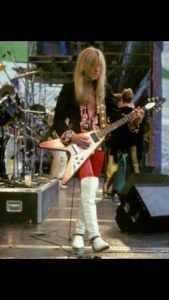 You are responsible for the leather look of Judas Priest. Where did you take it from?
You are responsible for the leather look of Judas Priest. Where did you take it from?
It’s a good question. What happened was: Myself and Rob we used to go to a big theatre in Birmingham and underneath the big theatre they had tons and tons of clothes that they used for the theatre. We used to rent some clothes. So, if you see me playing with Led Zeppelin in Oakland or you see me on the Old Grey Whistle Test, maybe I got some clothes that were rented from the theatre. Because these clothes looked great, I looked like a 16-century star and things like that. We couldn’t afford to have stage clothes made or buy stage clothes, so we rented clothes that were made for the stage. Me and Rob used to do that. Then, I had some over-the-knee cavalier black leather boots. I rented them those, but I never took them back, so I kept them and then I did have a pair of white ones the same. I had them made.
Then, I had some black satin pants made and a black shirt and a leather waistcoat and then I put some studs in and it slowly developed. In my mind, I was looking like one of those old musketeers from the 16th century, but I still didn’t have them in colour. It was all black and so I added a black jacket made in satin and then I had a leather choker made with the studs in. It slowly happened. Then, I really felt good because I wasn’t happy with how the band looked. Everybody was in different clothes, you know. It didn’t look strong. So, I said to Rob: “Come with me to London. I am gonna have some more clothes made”, which I did and Rob came with me. We went to this shop and there were these two lovely gay guys who were experts in making leather clothes and they made us some leather clothes and it went on from there. Likely, the other guys in the band started to like it that and they went on from there. So, I was very happy that it all worked out.
There is a nice photo of you and Eddie Van Halen holding a bottle of beer in your hands. What memories do you have of Eddie?
Really good memories, some crazy memories (laughs). I think that photograph was taken when we were up in Seattle. We used to hang out. The last time I saw Eddie I think was at Robert Plant’s birthday party in London. I can’t remember when that was, quite some time ago. The fond memories were the very early days when we were playing Santa Monica Civic Auditorium, Los Angeles and Eddie and Dave (ed: Lee Roth –Van Halen vocalist) would come along when they were just starting out. We went back in a jeep, me and Glenn and it was crazy-crazy times. It was perfect times. Back then in ‘80s, everything was fun and dangerous. It was good. I am very glad, very happy to have met Eddie and spent some time.
Could we blame Def Leppard for you passion about golf?
Yes, definitely. Because they were quite good golfers and they challenged me and Glenn to a game of golf on a day off, when they were opening for us in the States. That was a lot of fun and then me and Glenn we liked it and that’s how the story goes. We played golf in the morning and tennis in the afternoon and they kept us on the golf course.
Are you optimistic about the future of heavy metal?
I think so, but I am not sure and that’s why I wanted to do “Sermons of the Sinner” really, just to consolidate the fact that we must never give up this music that we love because you can always carry on producing new songs. Always! So, I wanted to prove that it was possible to do again and give everyone hope. This wonderful style of music I have witnessed in my lifetime and have been a part of the evolution of it, I would love to see it continue and thrive. That’s why I am looking forward to taking the band on tour and to exhibit how traditional classic metal is delivered to the audience and it’s gonna be great.
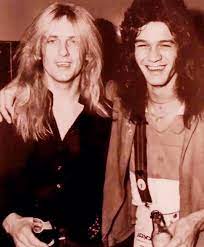 Why were you never really a big fan of Led Zeppelin or Black Sabbath?
Why were you never really a big fan of Led Zeppelin or Black Sabbath?
Yeah, I was never a big fan at the time. Obviously, I became a big fan and I now appreciate them. When I started in the late ‘60s there was no such a thing as “rock”. There was rock ‘n’ roll but not rock. There was no hard rock or heavy rock or heavy metal. All that was, was blues and progressive blues. So, all these wonderful bands: Fleetwood Mac, Led Zeppelin, Jethro Tull, Rory Gallagher, Ten Years After, even Cream, were progressive blues bands because they loved blues and I loved blues and they were experts on playing blues and they were adding to it, making it more interesting. It was progressing with long improvised solos. Peter Green was incredible in writing progressive blues songs like “Albatross”, “Oh Well”, “Green Manalishi”, long-long list of these songs. I said: “Wow!” This was really unique. But the thing is: Because I had seen Hendrix back in ’67 and I had heard a couple of other bands, I can hear heavy metal -not blues, not progressive blues- in songs like “You Really Got Me” in ’65 by The Kinks and Jimi Hendrix in “Foxy Lady”, “Purple Haze” and “Manic Depression”. These songs were heavy-sounded, more riff-orientated.
So, I didn’t take too much notice of Led Zeppelin because I had something in mind with a lot more depth, meaning and heaviness. Then, when I heard Black Sabbath I thought: “This is a wonderful day” because there are other people on the planet like me who have been writing songs as well which became “Victim of Changes”, “Run of the Mill” or songs like that. We were all playing those songs and these are the songs that I like to play. When I heard Sabbath, they were great but different because they were miles away from Jimi Hendrix and I was leaning more towards “Manic Depression”, “Foxy Lady”, “Spanish Castle Magic”, more like those songs than Black Sabbath. I was focused more here than there. I was really happy when Black Sabbath came out because they were not a progressive blues band. There was no blues in that band, which is great! Because there were lots of that about. Then, Sabbath came out with the cross, moody and that was great, but I was always focused on something else and I carried on working and working and working and eventually it became Judas Priest as we know today.
Why did you call Greta Van Fleet the next Led Zeppelin?
One thing is for sure: I’m very confident that we are never gonna see Robert and Jimmy together again. So, I’m pretty sure that’s not gonna happen. But if that doesn’t happen, I think it’s good that we have younger guys playing their own songs that have a synergy and we can kind of relive the wonderful music of Led Zeppelin again, but with a difference. The guys have a talent for duty and they are not a tribute band. If we don’t have the original Black Sabbath, the original Judas Priest, the original Iron Maiden, the original Led Zeppelin in 20, 40, 50 years from now, then I guarantee, we ‘ll have a version of those bands. I think that’s wonderful because if somebody can show me now a young new band that really does for me what Deep Purple did in 1970, I will be a happy guy. So, if we have Great Van Fleet as Zeppelin and we have another band that is Deep Purple, and another band that is someone else, I think that’s not a bad thing. Because the thing is that we will still have classic rock/metal bands forever, if that happens. Give my love to all the fans in Greece and everywhere else you can reach out to.
A huge “THANK YOU” to Mr. K.K. Downing for his time. I should also thank Mrs. Jamie Roberts for her valuable help.
Official KK’s Priest website: https://www.kkspriest.com
Official KK’s Priest Facebook page: https://www.facebook.com/KKsPriest

